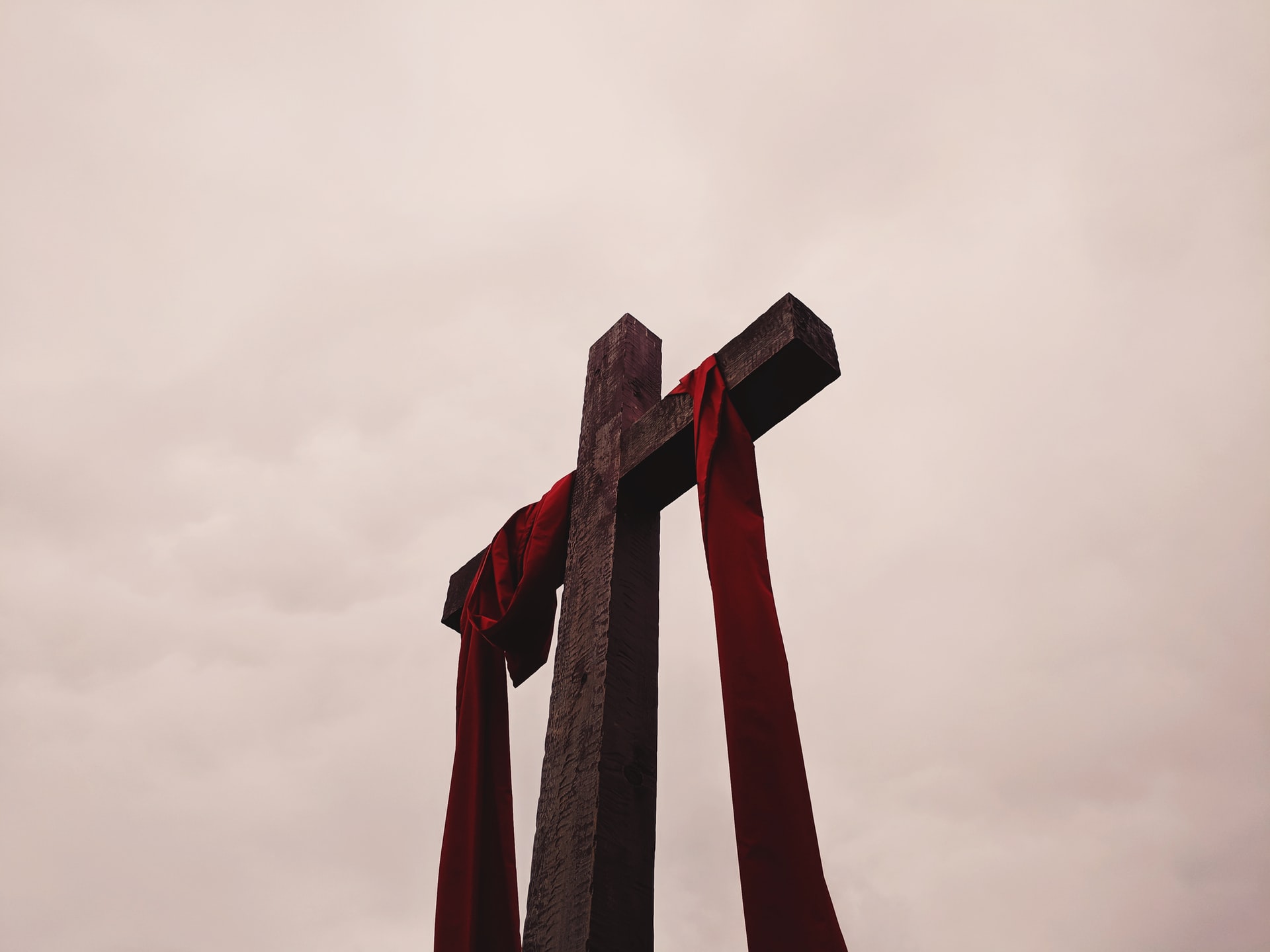John 18-19
The Arrest of Jesus
Read John 18:1–11. Judas led the soldiers to arrest Jesus. He had made the terrible decision to betray the Savior, not thinking Jesus would be crucified. When Judas saw the consequences, it was too late. His remorse was not repentance toward the Savior, but toward his deed. During the time Judas spent with Jesus, he never believed or was touched by the mighty things he witnessed. He made the wrong choice for eternity.
Read verses 4–6 again. When Jesus said, “‘I am he,’” the soldiers fell to the ground. They could not take Him prisoner unless He let them. But Jesus did not try to escape. He knew it was God’s plan for Him to die for our sins. Jesus told the soldiers that those with Him should be allowed to go free, for the soldiers were looking only for Him. Even as He was about to die, He thought that His own should not have to suffer as He.
Peter was ready to fight for his Lord. In fact, he drew out his sword and cut off the ear of a servant of the high priest. Luke tells that Jesus healed this man. Perhaps this was why the soldier did not punish Peter.
Jesus Before Annas
Read John 18:12–14. Annas and his son-in-law Caiaphas had both held the office of high priest at different times, and they had plotted together to kill Jesus. They were accusing Him of being a dangerous revolutionary leader. Caiaphas said that the Roman government would order their soldiers to kill all the people. Of course, this was not so. It was just the way that they could get the other religious leaders to give the death sentence to Jesus. They did this in spite of the fact that they knew the miraculous works Jesus had done.
Caiaphas also said that it was better for one man to die instead of all the people. He did not realize his own declaration of a great prophetic truth about Jesus’ death. Jesus was the sacrifice for our sins; through His death, salvation is made available to every human being.
You may wonder why Jesus could not save us without dying. God hates sin, so those who sin are separated from God. Sin brings death, and sin can only be appeased by a blood sacrifice. In the Old Testament, sheep, goats, and cattle were offered as sacrifices to take the place of the sinner—the
innocent dying for the guilty. Hebrews 9:22 confirms, “In fact, the law requires that nearly everything be cleansed with blood, and without the shedding of blood there is no forgiveness.”
These animal sacrifices had to be repeated again and again because they could not take away sin permanently. They were just a temporary arrangement until God sacrificed His own Son for us. Jesus would give His blood for us. If anything else could have saved us, God would never have let His only Son die. Jesus was the innocent sacrifice who gave up His life for guilty sinners. Now each of us can be reconciled to God by embracing
what Jesus did for us.
Peter Denies Jesus—Twice
Read John 18:15–18. The other disciple mentioned here was John, who wrote this Gospel. He did not hide the fact that he was Jesus’ disciple. But Peter, who thought he would be ready to defend Jesus, was afraid. Peter denied Jesus.
It is easy to let people know you are a Christian when you are with other Christians. It is not so easy when all the people around you do not believe or know Jesus’ teachings. Jesus said,
Whoever acknowledges me before men, I will also acknowledge him before my Father in heaven. But whoever disowns me before men, I will disown him before my Father in heaven. (Matthew 10:32–33)
The High Priest Questions Jesus
Read John 18:19–24. Annas had held the office of high priest, so he is called the high priest here, although Caiaphas held the position at this time. Annas tried to trap Jesus into saying something that they could use against Him in His trial, but Jesus would not answer his questions.
The soldiers took Jesus to Caiaphas’ house, where the religious court or Sanhedrin tried Him there. This trial was illegal—it was held secretly, at night, immediately after Jesus’ arrest. There was no opportunity to call witnesses to speak in His defense. Most of the Sanhedrin had already decided that Jesus should be put to death. They went through the form of a trial so they could turn Him over to Pilate with an official accusation.
Peter Denies Jesus Again
Read John 18:25–27. Three times Peter was asked if he was a follower of Jesus, and three times Peter denied his Lord. Then, a rooster crowed, just as Jesus had said. When Jesus looked at him, Peter saw how he had failed his Master, so he ran out crying, sorry for what he had done. We should be careful not to judge Peter who became the leader among the apostles. Through the denial, Jesus showed Peter how frail he was on his own. The same could be said of us if we do not keep focused on the Savior.
Jesus Before Pilate
Read John 18:28–40; 19:1–16. The Sanhedrin could not sentence anyone to death, so they sent Jesus to the Roman governor, Pilate. They accused Jesus of trying to set up His own kingdom. This was treason—a crime punishable by death.
Jesus did not defend himself against this false accusation. He told Pilate that He was a king, whose kingdom did not belong to this world. His kingdom is spiritual in the lives of those who believe in Him.
Jesus Sentenced to Death
In all the questioning, Pilate could not find any reason to condemn Jesus. He told the people this, but they still shouted for Jesus to be crucified. Pilate gave them a choice to allow Jesus or Barabbas, a robber, to be set free. The people chose Barabbas.
Pilate wanted to set Jesus free, but he was afraid of the people. They were threatening to report him to the Roman Emperor if he did not agree with them. His job and life would be in danger. He did not want to condemn an innocent person, but his own safety was more important to him. So Pilate finally turned Jesus over to be nailed to a cross like a criminal.
Like Pilate, everyone who hears the teachings of Jesus has to decide what to do with Him. Some are afraid to believe in Jesus as Savior because of what other people will say or do. Our eternal destiny depends on what we do now with His Son Jesus Christ. There are no choices without consequences. What is your own choice? What will you do with Jesus?
Jesus Nailed to the Cross
 Read John 19:16–27. Jesus was crucified between two criminals, and a sign over Him read, “Jesus of Nazareth, the King of the Jews” (v. 19). The chief priests did not like that, but Pilate refused to have it changed.
Read John 19:16–27. Jesus was crucified between two criminals, and a sign over Him read, “Jesus of Nazareth, the King of the Jews” (v. 19). The chief priests did not like that, but Pilate refused to have it changed.
While Jesus was suffering on the Cross, He thought of others rather than himself. He gave His mother into the care of the disciple John. From other gospels we learn that He even prayed for God to forgive the people who had nailed Him to the Cross.
The Death of Jesus
Read John 19:28–30. All the Old Testament prophecies about the Messiah’s death for our sins were fulfilled when Jesus died on the Cross. It happened exactly as the prophets had predicted hundreds of years before, even to the soldiers gambling for His clothes and offering Him sour wine to drink.
When Jesus cried, “‘It is finished’” (v. 30), He finished the work God had assigned Him. His death paid for our salvation. The nations of the world could believe in Jesus, be free from the burden of sin, and have everlasting life. Indeed, it was for the sins of humanity throughout time that Jesus dies. We cannot blame the Jews, Pilate, or the soldiers who crucified Him. It was sin—our sin—that inevitably made Him go to the Cross to save us. Knowing this should makes us contrite, repentant of our sins. We do not want to keep on doing the things that caused Jesus’ death. So we ask God to forgive our sins. By believing and embracing what Jesus has done for us, we are saved. First Peter 2:24 affirms, “He [Christ] himself bore our sins in his body on the tree, so that we might die to sins and live for righteousness.”
Prophecies Fulfilled
Read John 19:31–37. Crucifixion was a slow, agonizing form of execution. The soldiers broke the legs of the victims to make them die sooner. In Jesus’ case, the soldiers found Him already dead, so they did not break His bones. This was a fulfillment of prophecy. (See Psalm 34:20.)
When the soldiers pierced Jesus’ side, this also was the fulfillment of prophecy. Zechariah 13:1 records, “‘On that day a fountain will be opened to the house of David and the inhabitants of Jerusalem, to cleanse them from sin and impurity.’” Also, 1 John 1:7 says, “The blood of Jesus, his Son, purifies us from all sin.”
The Burial of Jesus
Read John 19:38–42. Joseph of Arimathea and Nicodemus were both prominent religious leaders and members of the Sanhedrin. They had not voted for the death of Jesus. Up until then they had been secret believers in Jesus, afraid to come out openly for Him.
To share our faith with others is not always easy. However, Jesus promised to be with us. He will give us the right measure of strength and confidence. When most needed, God gave Joseph and Nicodemus courage to ask for Jesus’ body and to bury it, showing their respect and love for Him. This fulfilled another prophecy: that the Messiah would be with the rich in His death.
The burial custom there was to wrap the body with spices and place it in a cave dug out of the rocky hillside. From the other Gospels we learn that Jesus’ body was buried in the tomb of Joseph of Arimathea. There was not enough time to finish all the preparations for burial because it was nearly night when Jesus died, and the Sabbath began at sundown. So the body of Jesus was put in the tomb without all the preparations for burial being finished.
